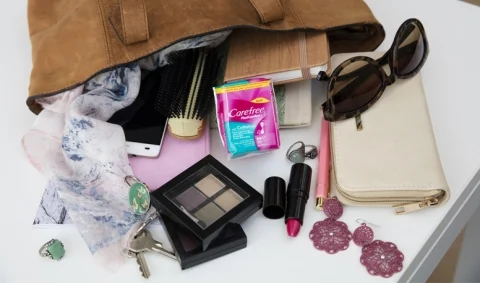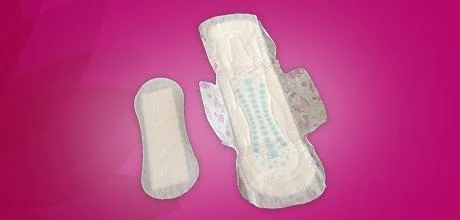What is menstrual or period bloating in females?
The onset of the period can be a stressful time for some women, who experience bloating as a symptom. Period bloating can cause discomfort and can also be painful at times. It takes a little patience and some adjustments to make it easier to manage.
Eight out of ten women on average suffer from bloating at some time during their menstrual cycle. Bloating occurs when the body retains fluids, resulting in a feeling of being overly full or being swollen around the waist area. Although mostly around the waist, bloating can also happen in the breasts, face, abdomen, legs, ankles, and feet.
Bloating is not the same as menstrual cramps and does not have any other side effects. It’s not serious, but can be very annoying for sure. Bloating not only makes you look and feel plumped up, but it also makes you crave foods that are high in sodium, like junk food, which further fuel water retention, creating a vicious cycle.
When and why does it occur?
Bloating is generally caused by two major changes. One is water retention, where the hormones influence the amount of fluid in your tissues and make them store water ahead of the period. The second is that women tend to feel down, and binge on sugary foods and chocolates at this time of the month, which can cause disturbances in the bowels. The build-up of wind or gas in the bowels can also cause bloating.
Of the two, changing hormones are the leading cause of bloating by far. The hormones, oestrogen and progesterone, fluctuate, causing the cells to retain water to protect themselves.
Bloating can also be caused by factors like genes, the type and amount of vitamins and minerals consumed, diet, especially if it’s high in sodium, the beverages you consume, like caffeine and alcohol.
The water is usually dispensed from the body by the third day of the period, and the bloating goes away, although it is different for every woman.
4 Ways to manage period bloating
There are a number of steps to take which could help:
1. Keep your digestive system healthy. Taking care of what you eat and drink is going to have the most significant impact on your symptoms. You should be able to work out the foods that will aggravate your symptoms and no matter how tasty they are, cut these down during this time of the month
2. Potassium and magnesium. These are important minerals for reducing the symptoms associated with water retention. They help to counterbalance the level of sodium in the body. Sodium leads to water retention and the more sodium you eat (found in all those salty snacks) the more potassium and magnesium your body needs to counter the effect. Magnesium and potassium occur naturally in foods such as dark leafy greens or bananas. If bloating is a regular and troublesome symptom, it may be worth trying a magnesium supplement, (as well as reducing your salt intake)
3. Cut back on foods rich in refined sugar. Consumption of sugar triggers the release of insulin into the bloodstream. This, in turn, causes the body to retain sodium, which leads to water retention and bloating
4. Keep hydrated. Although it seems counterintuitive to drink plenty of water when you are suffering from fluid retention, it is actually really important to keep hydrated. If you do not drink enough, your body thinks that there is a drought about to come and stores the water it has rather than letting it pass through. It is important to keep hydrated all through the month, not just when your symptoms become apparent.
How can you prevent period bloating?
Since period bloating is caused by internal factors, the best you can do is try to control the external factors so that the condition is not aggravated. You cannot control the hormones, but you can eliminate some factors that increase fluid retention.
Some of these include:
Reduce your intake of salt, which is a major cause of fluid retention in itself.
Sugar, alcohol, and caffeine are all responsible for bloating, so avoid them, especially during the middle of the cycle.
It might sound odd, but drinking water can actually help reduce bloating.
Regular exercise increases blood circulation, which helps prevent bloating.
A healthy diet of green leafy vegetables, such as kale, collard greens, spinach, avocado, and beetroot, and fresh and dried fruits, are good choices to prevent bloating.
Menstrual bloating treatment
Bloating is a side effect of menstruation, so it does not require treatment unless you experience complications as a result of it. Symptomatic relief, however, can help alleviate some of the stress and annoyance caused by bloating.
You can find a range of vitamins and minerals that help with bloating, so consult your doctor about which one will suit you best.
Fruits like watermelon, oranges, lemons, and grapes alleviate bloating.
Diuretics increase the water and salt that is cleansed through urine, which helps with water retention.
Any herb that aids digestion is a good bet as it will help clear out the system and alleviate gas. Some herbs that help include peppermint, chamomile, ginger, lemon balm, and fennel.
Available in oil and tablet form, primrose blocks the impact of the increase in prostaglandins that can add to bloating.
Treat the bloating with heating pads to alleviate discomfort.
Relaxation techniques like yoga and breathing exercises help calm fluctuating hormones.
The acetic acid in apple cider vinegar balances out the hydrochloric acid that your stomach makes, which reduces bloating.
Consuming smaller meals will help to alleviate bloating as it prevents the build-up of gas.
Protein and potassium-rich foods like bananas, cantaloupe, tomatoes, and asparagus, chicken, fish, and tofu, help with muscle contraction and bloating.
Avoiding any foods that cause gas can go a long way in keeping that uncomfortable feeling of being fully out of the way.
When should you visit the doctor?
Although bloating is a normal part of the menstruation cycle, and most women experience it at some point or another, you do need to ensure it does not cause you more than some discomfort. Consult a doctor if the bloating does not go away after your period, and causes pain that affects your daily routine. Severe bloating may be a sign of a medical condition and needs to be treated by a professional.
Note: This article is for informational purposes only and does not constitute medical advice.


